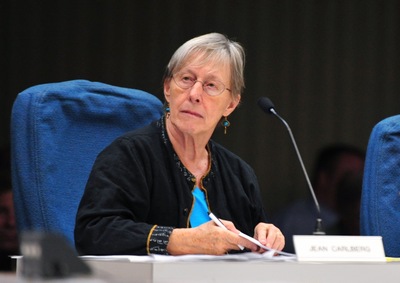Should the city of Ann Arbor have a policy directing 85 percent of the proceeds from future sales of downtown city-owned properties toward affordable housing?
That's still the multimillion-dollar question.
The Ann Arbor City Council took Council Member Sandi Smith's proposal, which would do just that, and referred it to the council's budget committee Monday night for further review.

Sandi Smith is voluntarily stepping down from the Ann Arbor City Council in November, but before she goes she's putting up one last fight for affordable housing funding. The council delayed making a decision on her proposal Monday night, referring it to the budget commit for closer review.
Ryan J. Stanton | AnnArbor.com
Anglin's resolution, which will come back to council at its next meeting, calls for creating a committee made up of 10 residents — two from each ward — as well as a handful of city officials.
He wants the committee to study the available options for making use of the potentially millions of dollars the city could get from selling surface parking lots it owns downtown.
"I think Council Member Anglin is on the right track that we do need to have a community discussion that is outside of that of the DDA," said Council Member Stephen Kunselman, D-3rd Ward. "I don't always agree with the DDA."
The Downtown Development Authority already is evaluating options for redeveloping five city-owned parcels as part of the Connecting William Street planning initiative. The DDA at its last meeting endorsed Smith's idea of channeling future sale proceeds toward affordable housing.
Smith, D-1st Ward, is asking her colleagues to set a policy directing 85 percent of the proceeds toward the city's housing trust fund, with another 10 percent going toward other capital improvement projects and 5 percent going toward public plaza or open space improvements downtown.
She noted that in 2004 the Washtenaw Housing Alliance created a "Blueprint to End Homelessness" with a goal of increasing the number of permanent supportive housing units by 500 by 2014. Since 2004, Smith said, 323 affordable rental units have been added countywide, 100 units have been removed, and 79 have been converted to market rate units, for a net gain of 156 units.
The 100 affordable units that were lost came when the city demolished the old YMCA building and the affordable housing that stood there at the corner of Fifth and William.
Making a case for her resolution, Smith noted the Ann Arbor Housing Commission received more than 17,500 applications for its 1,400 housing choice vouchers in a 48-hour period in August. She said the Ann Arbor Public Housing waitlist has more than 4,000 people on it currently.
She also noted the city manages and maintains 355 low-income housing units in 67 buildings with an identified need for investment of $14.5 million over the next 15 years.
"We need to make a concerted effort to establish a significant fund to build new affordable units, maintain the ones we already own, and provide services to those who need it most," she said.
Ingrid Ault, a member of the city's Housing and Human Services Advisory Board, said her group unanimously supports Smith's resolution.
"It is time to take the stated community goals regarding housing seriously," Ault told council members. "We can no longer turn our back on those in the most need."

Jean Carlberg at a past Planning Commission meeting. She appeared before council in her capacity as a Washtenaw Housing Alliance board member Monday night to lobby in support of Smith's proposal.
Ryan J. Stanton | AnnArbor.com
Carlberg said hundreds of adult individuals and hundreds of families with children have called a local housing access line in the past year saying they were facing a housing crisis.
"Our goal in the community is to deal with this in the most efficient way, which would be to prevent people from becoming homeless by assisting them with perhaps a month's rent or a security deposit to move to a less-expensive apartment," she said.
"Our second choice is rapid re-housing where somebody has lost their housing and there is the rub," she said. "We do not have anywhere near the housing in this community to re-house people who have lost their housing."
Carlberg said there's a serious lack of housing units in Ann Arbor with rents that are low enough for people in crisis and facing an immediate need.
"So what we are doing is outsourcing the people in our community who are struggling with housing," she said. "The age group that's most affected with this are from 18 to 50. Young women in the 18 to 30 age range and then women and men from 30 to 50, in very large numbers, are suffering as individuals. The same thing in families. Huge numbers in this age range."
Carlberg said many of those in crisis had jobs but lost them or are presently employed but don't make enough to support themselves and their families.
"The cost to this community of not being able to keep them in stable housing is tremendous," she said. "It affects all of those children who cannot stay in the same school district for more than a couple of months because they have to move to another relative or to another friend who will take them in for a short period of time. It's tremendously damaging to their educational foundation."
Carlberg said that damages the entire community, and the same goes for not being able to provide stable housing for adults who have other issues to deal with, such as mental health, substance abuse and domestic violence issues.
Revisiting an old policy
For many years, Smith said, the city appropriated funds to its housing trust fund to support projects that create, retain, rehabilitate or preserve long-term affordable housing.
She recalled that in 1996 the City Council first created a policy to direct a portion of the proceeds from the sale of public land to the housing trust fund. In 1998, the council revised that policy to dedicate all of the proceeds to the housing trust fund, but in 2007 the council repealed that policy.
Kunselman said he was on council in 2007 when the decision was made to repeal the previous directive and it was easy to do — it only took six votes.

Council Member Stephen Kunselman, D-3rd Ward
Ryan J. Stanton | AnnArbor.com
Mayor John Hieftje and Council Member Christopher Taylor, D-3rd Ward, agreed with Kunselman that any council action taken now would serve as little more than a guideline.
"It really is no more than an advisory for future city councils, because I can guarantee you — without a doubt — that there will be different council members around this table at the time of sale of any land, because it's going to be a ways down the road," Hieftje said.
Hieftje said he's a supporter of putting a significant percentage of the sale proceeds toward affordable housing, but he also recognizes there are other capital needs.
He said he wants to make sure there's a mechanism in place so debt on the Y Lot, for instance, is paid off before any remaining proceeds are directed toward another fund.
"We're ahead of ourselves," Kunselman said at one point during the discussion. "We don't know what properties we're selling. We're not even close to that."
Kunselman added, "We're having a lot of discussion for something that's certainly not going to be taking place anytime soon, so we have lots and lots of time."
Kunselman said he could support Smith's resolution if all of the funding were guaranteed to go to the Ann Arbor Housing Commission because he knows there's need there.
Smith said a robust housing trust fund will allow the city to leverage state and federal dollars, as well as act on opportunities that become available to expand and improve affordable housing options.
She noted the Shelter Association, Avalon Housing, Washtenaw Housing Alliance, Ann Arbor DDA and the Washtenaw County Board of Commissioners all support her general idea.
Smith said the community's need for affordable housing continues to outpace the ability to provide units, and there is no policy in place to direct funds to the housing trust fund anymore. She noted the city in recent years revised its zoning rules to reduce or eliminate planned unit developments (PUDs), which had been another contributing source to the housing trust fund.
"Historically the city has made contributions to the affordable housing trust fund, which we have not done since 2009," she said. "We've expended nearly all the funds down over the last few years during probably the most devastating economic downturn in any of our lives."
Ryan J. Stanton covers government and politics for AnnArbor.com. Reach him at ryanstanton@annarbor.com or 734-623-2529. You also can follow him on Twitter or subscribe to AnnArbor.com's email newsletters.